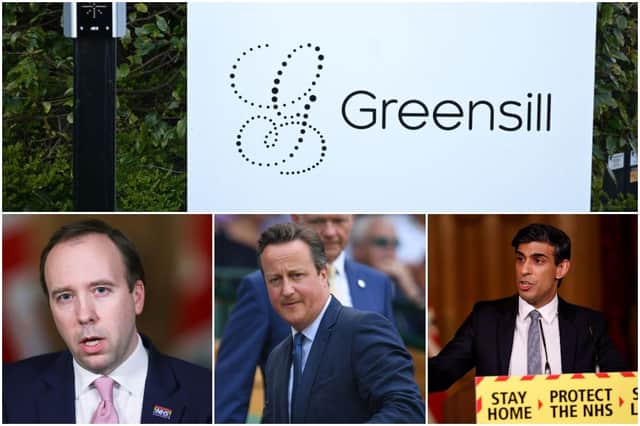What is the Greensill scandal? David Cameron’s lobbying of Greensill capital explained


The row over former prime minister David Cameron’s lobbying on behalf of now-defunct financial firm Greensill Capital has been building up over the last month, and looks set to continue for some time.
The government has announced an independent review, and a number of governmental departments are expected to confirm their own probes - while the former PM has said he will “respond positively” to the inquiry.
Advertisement
Hide AdAdvertisement
Hide AdSo what is the Greensill lobbying scandal, how is David Cameron involved, and what is Greensill Capital? This is what you need to know
What is the background to the Greensill lobbying scandal?
The row began over claims that Cameron had contacted government officials, including the chancellor, to get financial services company, Greensill Capital, access to a government-backed loan scheme.
Greensill Capital went into administration after many creditors expressed doubts over its valuation and debt piled up.
While the firm did not use the scheme Cameron pushed for access to, the scandal has raised a number of questions about lobbying in politics.
Since initial reports emerged, a number of connected issues have come to light, including private meetings between Cameron, Greensill Capital’s CEO, Lex Greensill, and the health secretary Matt Hancock.
Questions have also been raised about Lex Greensill’s prior formal role within government, after an old business card of his emerged, listing him as “Senior Adviser, Prime Minister’s Office”.
The issue has prompted greater scrutiny of the wider lobbying industry, and what some have described as a “revolving door” between business and government, which sees politicians and civil servants move between roles in the two distinct sectors too easily.
While some would argue that it is inevitable that top figures from business might move into politics and vice-versa, many have expressed concerns that close relationships between certain firms and government could have implications for government procurement, with some firms receiving preferential treatment due to links with certain politicians or parties.
What did David Cameron do?
Advertisement
Hide AdAdvertisement
Hide AdDavid Cameron has come under fire for his attempts to lobby the government on behalf of a firm he works for, Greensill Capital, to access government-backed Covid loans.
Through reporting in the Financial Times and Sunday Times, it emerged that the former PM had contacted senior government officials on several occasions over a number of months in mid-2020.
He was trying to get Greensill access to the government-backed Covid corporate financing facility (CCFF), which is a scheme providing cheap emergency loans.
Soon afterward it became clear that Cameron’s lobbying efforts included multiple text messages sent to the chancellor, Rishi Sunak.
The Chancellor would later confirm this, and release the messages he sent back to Cameron, including one in which he promised to “push” his officials to try and find a way to allow Greensill to access the CCFF.
The heightened scrutiny of Cameron’s links to the firm and lobbying efforts on their behalf also led to revelations that the former PM arranged a private drink with Matt Hancock and Lex Greensill, to discuss a payment scheme which the NHS later used.
Cameron also emailed a senior adviser in Downing Street, after it became clear that Greensill would not be able to access the emergency funding, urging them to reconsider the application.
What is the problem with what he did?
The main issue is whether Cameron’s relationship with the government, as a former prime minister and colleague to many within it, meant that he got special access to lobby for loans, tantamount to preferential treatment.
Advertisement
Hide AdAdvertisement
Hide AdHis efforts to secure access to the money are perhaps more concerning given what happened to Greensill afterwards, as the company went into administration less than a year later, leaving many creditors seeking repayment which may not be forthcoming.
While it was initially reported that Cameron was acting as a consultant for the firm in 2018, receiving a significant amount of shares as payment, it has since been claimed that Cameron was taken on as an employee.
While some reports have described the shareholdings as being worth several million pounds, in a statement released last week Cameron sought to play down their value, though didn’t reveal their actual projected worth.
Either way, the shareholdings would have been worth a considerable amount of money had the company not folded, raising questions over Cameron’s motivations for helping the firm to get cheap finance, which may have prevented - or at least stalled - its collapse.
So far, a number of bodies set up ostensibly to act as watchdogs over this kind of activity have failed to fully investigate the issue.
The Treasury select committee, which has a Conservative majority, voted against an inquiry into the issue, and the registrar of consultant lobbyists saying it didn’t meet its criteria, as Cameron was an employee, not a consultant.
Who is Bill Crothers?
David Cameron’s lobbying activities have brought greater attention to the issue of senior government officials and civil servants taking up roles at companies which could stand to benefit from links to government.
Bill Crothers served as the government’s chief commercial officer between 2012 and 2015, in a role which involved advising ministers on procurement, effectively overseeing around £40bn worth of spending.
Advertisement
Hide AdAdvertisement
Hide AdWhile still employed by the government on a £149,000 taxpayer-funded salary, Mr Crothers took on an advisory role at Greensill Capital in 2015, and became a director at the collapsed financial firm afterwards.
Despite existing rules on senior government figures having to consult with a special advisory body, ACOBA, about any new roles taken up in the two years after leaving office, his appointment was only brought to light recently.
Upon learning of Crothers’ relationship with Greensill Capital Boris Johnson decided to widen the scope of the independent review, and civil servants have been told to disclose any second jobs urgently.
Read more NationalWorld coverage of the Greensill Capital/David Cameron lobbying scandal